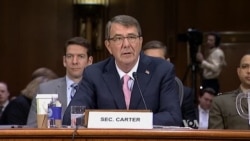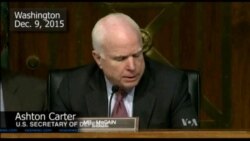The Obama administration said it is boosting military pressure on Islamic State militants in Syria and Iraq, but remains opposed to deploying any substantial U.S. combat forces in either country despite IS’ demonstrated ability to inspire terrorism on American soil. Defense Secretary Ash Carter also called for stepped up international help in the fight.
Testifying before the Senate Armed Services Committee, Carter said Wednesday that sending a large number of U.S. ground troops would amount to “fighting on the enemy’s terms.”
“By seeming to Americanize the conflicts in Iraq and Syria, we could well turn those fighting ISIL or inclined to resist their rule into fighting us instead,” Carter told said.
The committee’s chairman, Republican John McCain, responded with incredulity.
“Do you really believe that if the United States struck back against the people that just slaughtered some Americans in San Bernardino that somehow that would encourage them (IS)? What encourages them, Mr. Secretary, is success," McCain said in his opening statement.
“ISIL’s threat against our homeland is real, direct, and growing. We are not winning this war, and time is not on our side," he said.
'Accelerate' anti-IS efforts
Carter provided the committee with an overview of U.S. efforts to “accelerate the campaign” against Islamic State, including dispatching special operations units and mounting airstrikes on oil tankers that help finance the group. He said the fight against the group could use more help from other countries around the world.
"The international community including our allies and partners has to step up before another attack like Paris, " he said, referring to the November 13 terrorist assault on the French capital that was claimed by IS.
Carter urged Turkey to do more to "control its often porous border" with Syria and criticized Saudi Arabia and other Gulf states for being "pre-occupied by the conflict in Yemen" and not paying enough attention to the fight against IS.
He said it is time for Russia, which has been carrying out airstrikes in Syria, to "focus on the right side of this fight." Carter added that the U.S. has asked about 40 countries for more contributions, including special operations forces and weapons.
Carter said ground forces are needed to fight IS but should be provided by America’s allies in the region, an assertion echoed by the committee’s top Democrat, Senator Jack Reed.
“A sustainable defeat of ISIL requires that ground combat forces be primarily local forces,” Reed said. “Putting large numbers of U.S. troops on the ground … in Iraq and Syria could play directly or indirectly into ISIL’s propaganda war.”
McCain responded by pointing out that he, too, is opposed to a massive U.S. invasion force, but he argued that ground units from allies in the region will not materialize unless the United States takes the lead on the battlefield.
Cruz's 'carpet bomb' comments
The hearing came days after one committee member, Republican presidential hopeful Ted Cruz, urged a U.S. anti-IS campaign to “carpet-bomb them into oblivion.”
“I don’t know if sand can glow in the dark, but we are going to find out,” Cruz added at a Republican forum in Iowa.
At the hearing, Democratic Senator Claire McCaskill sought reaction to Cruz’ comments.
“How many women and children would be involved if we carpet-bombed the area where ISIS currently has a stronghold? What are we talking about in terms of lives lost?” McCaskill said. “I would have to assume it would put their [IS] recruiting on steroids.
“The process you described … is not the way that we apply force in combat. It isn’t now, nor will it ever be,” said the vice chairman of the Joint Chiefs of Staff, General Paul Selva, who testified alongside Carter.
“It’s clear from ISIL’s strategy that their objective is to cause us to engage in what they believe is an apocalyptic war with the West,” Selva added. “And anything we do to feed that particular frame of thinking counters our national security.”
Cruz did not retreat from his comments at a news conference at the Capitol Tuesday, accusing the Obama administration of dereliction of duty in the fight against Islamic State.
“We have a commander-in-chief who refuses to acknowledge the enemy, much less confront the enemy, much less do what it takes to defeat the enemy,” Cruz said.







